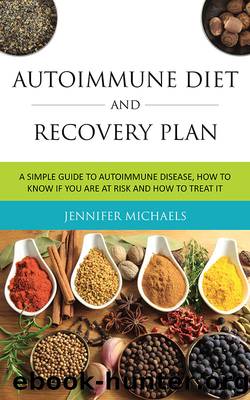Autoimmune Diet and Recovery Plan by Jennifer Michaels

Author:Jennifer Michaels
Language: eng
Format: epub
Publisher: Speedy Publishing LLC
Published: 2013-12-20T00:00:00+00:00
Prebiotic foods and fibers help the body to restore good bacterial population levels in the intestinal tract. Consuming probiotic foods, such as live bacterial cultures, then grow more effectively. Antibiotics, poor diet, illness, and stress may result in low good bacteria levels. Intestinal permeability (leaky gut) occurs when the intestinal bacterial layer and mucosa are insufficient to protect partially digested foods or wastes from entering the bloodstream. Autoimmune reactions may result from repeated attempts to defend the body from these âinvaders.â
Author Ronald Ross Watson (âBioactive Foods in Promoting Health: Probiotics and Prebioticsâ) recaps a significant number of animal studies to make the case:
--Lactobacillus reuteri reduces inflammation and prevents the development of some bowel diseases in laboratory animals, L. reuteri is less effective at managing inflammation than L. fermentum.
--Lactobacillus salivarius alo reduces inflammation y reducing Th1 cytokine expression such as MPO and iNOS. Studies show that L. salivarius actually restores healthy glutathione levels in sick animals while reducing inflammation.
--Lactobacillus casei reduces inflammation y regulating pro-inflammatory cytokines, such as IFN(gamma) and IL-6. It also inhibits ICAM-1 gene expression, reduces MPO and IL-12 cytokines.
--Lactobacillus rhamnosus reduces inflammation by reducing pro-inflammatory PGE2, NO, iNOS, and MPO levels.
--Lactobacillus fermentum reduces inflammation by reducing pro-inflammatory cytokine levels such as iNOS and MPO while restoring healthy antioxidant levels.
--Escherichia Coli (Nissle 1917) reduces inflammation by reducing MPO and other pro-inflammatory cytokines.
--Bifidobacterium infantis reduces inflammation by lowering levels of Th1 cytokines while maintaining TGP(Beta) levels.
--Bifidobacterium bifidum reduces inflammation while reducing pro-inflammatory IFN(gamma) and MCP-1.
Clearly, results of animal studies may not perfectly translate to the human bodyâs responses to probiotic bacteria. But reported immunoregulatory activities resulting from proper levels of good bacteria warrant strong consideration from autoimmune disease sufferers. Probiotic organisms may exert positive effects by moderating intestinal microbiota which in turn work to product antimicrobial proteins. By inhibiting epithelial adhesion or transference of pathogens, probiotics may positively impact the bowelâs barrier function. The resulting decrease of mucous permeability helps to protect and secure the body from potential infectious and/or autoimmune response triggers. Most importantly, reducing the level of pro-inflammatory cytokines modulates the autoimmune response.
Prebiotics such as polysaccharides (inulin, plantago ovata peel/seeds, germinated barley foodstuff), oligosaccharides (fructo-oligosaccharides, galacto-oligosaccharides, soybean oligosaccharides, xylo-oligosaccharides, and short-chain fructo-oligosaccharides), and dissacharides (trans-galacto-oligosaccharides) encourage healthy good bacteria growth and maintenance in the intestines. Prebiotic supplementation may be the easiest way to ensure an adequate supply. Some probiotic supplements may also contain a prebiotic base. Alternatively, taking a tablespoon of organic plantago ovata (psyllium) and consuming fibrous fruits and vegetables along with probiotics supports the goal of a healthy, problem-free intestinal tract.
âImmune system-enhancingâ herbs
Autoimmune disease implies an already overactive immune system. According to the University of Maryland Medical Center, herbs such as astragalus should be avoided when treating an autoimmune disorder. This herb may interfere with helpful supplements and therapies.
Conclusion
Adding important nutritional or nutraceutical supplements can make good sense for deficient individuals. Before supplementing with any vitamin, mineral, oil, or herb, make sure to check with your primary care provider to avoid potential drug interactions.
6. The Autoimmune
Download
This site does not store any files on its server. We only index and link to content provided by other sites. Please contact the content providers to delete copyright contents if any and email us, we'll remove relevant links or contents immediately.
Men In Love by Nancy Friday(5229)
Everything Happens for a Reason by Kate Bowler(4729)
The Immortal Life of Henrietta Lacks by Rebecca Skloot(4571)
Why We Sleep by Matthew Walker(4429)
The Sports Rules Book by Human Kinetics(4377)
Not a Diet Book by James Smith(3408)
The Emperor of All Maladies: A Biography of Cancer by Siddhartha Mukherjee(3138)
Sapiens and Homo Deus by Yuval Noah Harari(3057)
Day by Elie Wiesel(2778)
Angels in America by Tony Kushner(2641)
A Burst of Light by Audre Lorde(2588)
Endless Forms Most Beautiful by Sean B. Carroll(2470)
Hashimoto's Protocol by Izabella Wentz PharmD(2367)
Dirty Genes by Ben Lynch(2311)
Reservoir 13 by Jon McGregor(2293)
Wonder by R J Palacio(2201)
And the Band Played On by Randy Shilts(2185)
The Immune System Recovery Plan by Susan Blum(2053)
Stretching to Stay Young by Jessica Matthews(2023)
